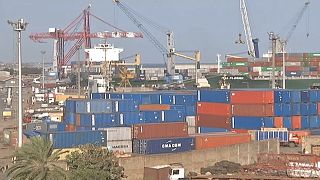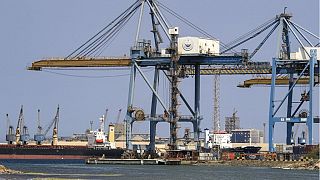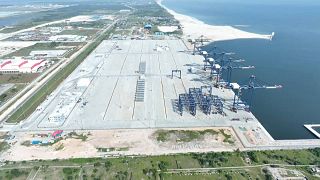nigeria economy
Nigerian President Muhammadu Buhari has marked the opening of a $1.5 billion, Chinese-funded deep seaport in the commercial hub of Lagos that authorities hope will help grow the West African nation's ailing economy.
The Lekki Deep Sea Port is one of the biggest in West Africa and will create hundreds of thousands of jobs in addition to easing cargo congestion that costs billions of dollars in annual revenue, Lagos Gov. Babajide Sanwo-Olu said Monday (Jan. 23).
The port can handle at least 2.5 million 20-foot standard containers per year and will be operated as a joint venture between the Nigerian government, Singapore-based Tolaram Group and the Chinese state-owned China Harbor Engineering Company.
Both foreign companies own a majority stake of 75% in the project.
Nigeria is Africa’s largest economy but growth has been stalled for many years due to poor infrastructure and mismanagement.
Although it has six major seaports, more than 80% of the country's imports are handled by just two of the ports in Lagos, where congestion has led to a massive loss in revenue as cargoes are often diverted to other West African nations.
Expected economic benefits
Authorities say the new deep seaport on the eastern edge of Lagos would divert traffic from congested ports and shore up earnings, with expected economic benefits of more than $360 billion.
"There is poor and underinvested rail network connectivity, and the roads are not in top-notch condition," said Ayotunde Abiodun, an economic analyst with the Lagos-based SBM Intelligence firm. "Also, the automation of processes at the port must be prioritized."
Experts, however, argue it would make a "minimal difference" if existing pitfalls are not removed, including ensuring connections between ports and inland areas.
With the first ship due to dock this coming Sunday, Lagos governor Babajide Sanwo-Olusaid said ships docking at the port "could be up to four times the size of vessels that currently berth at both Tin Can and Apapa ports," the other two ports in Lagos.
Agriculture and trade are key drivers of Nigeria’s economy, but widespread insecurity in the agricultural-rich north, dwindling foreign direct investments and endemic corruption have slowed economic growth amid reduced earnings from crude oil.
The government has turned to international lenders and funders to help grow the economy through critical projects, among them China, whose footprint are on some of Nigeria’s most important infrastructure projects such as rail networks and airport terminals.
The port has "immense potential" for the economy of Nigeria, which is battling a 33% unemployment rate and an ailing economy, said Abiodun, the analyst who added that industry players must work together for this to happen.
In the maritime sector, “there needs to be interagency engagement on important issues affecting industry operators," Abiodun said. "A more troubling challenge has been the focus of these agencies on revenue generation rather than on value service delivery. This needs to change."













01:00
Pix of the Day: July 16, 2025
00:52
Nigeria's former president Buhari laid to rest in his hometown of Daura
02:19
Abuja residents celebrate Igbo festival in grand style
01:00
Pix of the Day: July 15, 2025
Go to video
Former Nigerian President to be buried today
02:03
Muhammadu Buhari's legacy: higlight of his presidential tenure